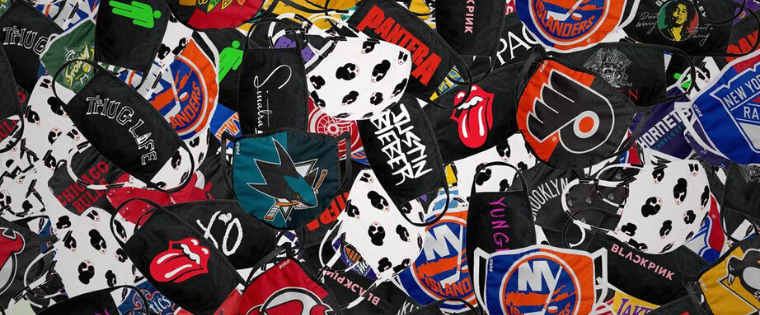Do Masks Have Legs?

Is a business that sprung to life several weeks ago a relatively short-term opportunity – in the words of one manufacturer, “As soon as there’s a vaccine, it’s dead” — or a permanent addition to the fabric of the consumer product (and licensing) landscape?
First, the maker market
Initially, makers on sites such as Etsy, Redbubble and others were virtually alone in pumping out masks; brand owners may have been interested, but didn’t want to be seen as pandemic profiteering.
Soon, though, major entertainment companies, sports leagues, fashion and apparel houses (Kim Kardashian-West’s Skim shapewear brand?) and others jumped into the fray, working through licensees such as Trevco (via its maskClub.com) and FOCO — all with a charitable component. And Nordstrom, The Gap and other retailers have started ecommerce sales, but with no blueprint for gauging demand now let alone two years out.
Gauging Demand
The demand is there now – Etsy said it sold 12 million in April, generating $133 million in revenue — but it’s not clear for how long. As one writer put it: “Key variables are missing: Are masks situational products that we only bring out for crowded events like concerts? Or are they everyday items? Will people want a new one every week? Or use the same one for years? Analysts and executives just don’t know.” Of course, as she adds, the biggest variable is the coronavirus itself.
In April, FOCO CEO Michael Lewis, whose company produces the sports-licensed masks sold through Fanatics, told us he viewed the business through the lens of other fads he’s jumped on, such as silicon wristbands and fidget spinners, with a quick ramp-up to fill the pipeline and the knowledge that when it ends, it will do so suddenly.
The case for a longer term
Trevco’s Trevor George is convinced there’s a longer-term opportunity in many global markets – he just launched MaskClub in Europe. The business is “going to get massive come back to school in the fall and even if there is a vaccine you are still going to have to wait to get one,” he says.
“And when the pandemic is over, people are still going to think about influenza totally differently because they are going to be getting on airplanes, public transport and attending public events wearing masks. That may involve a smaller percentage [of people], but I thought this was something that would be dead in 18 months. But there is no chance of that happening anymore.”
And the longer it lasts, the more chances for creative executions. One consumer suggested to Trevco that it design a tribute to health care workers in the form of a mask based on Star Trek nurses aboard the Starship Enterprise, a departure from more standard Star Trek fare.
Who knows? Maybe the business will live long and prosper.




